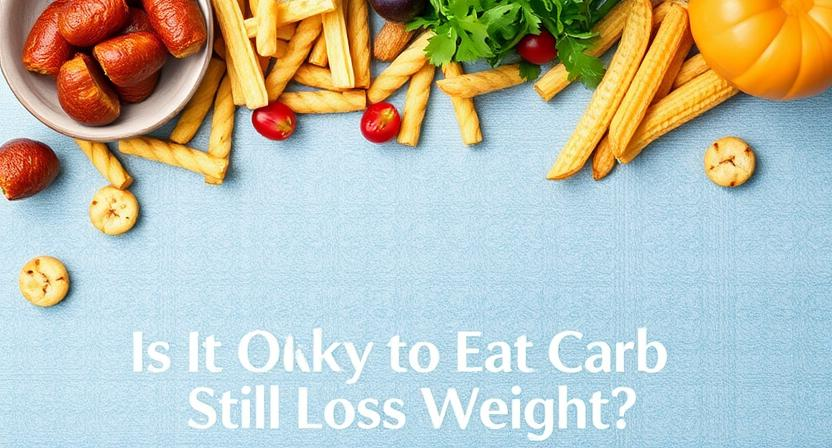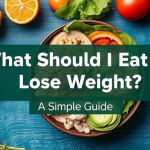When it comes to weight loss, one of the most frequently debated topics is carbohydrates. With many popular diets advocating for low-carb or no-carb approaches, it can be confusing to know if eating carbs can still be compatible with your weight loss goals. Carbohydrates are often vilified, but the truth is, they are an essential part of a healthy diet. In this article, we’ll explore the role of carbs in weight loss, whether eating carbs can help you shed pounds, and how you can include them in your diet while achieving your weight loss goals.
Understanding Carbohydrates
Carbohydrates are one of the three macronutrients (along with fats and proteins) that provide energy to the body. Carbs are found in a wide range of foods, including fruits, vegetables, grains, and legumes. There are three main types of carbohydrates:
- Sugars – These are simple carbohydrates found in foods like fruits, dairy, and processed foods.
- Starches – Complex carbohydrates found in foods like bread, pasta, potatoes, and rice.
- Fiber – Also a complex carbohydrate, fiber is found in whole grains, vegetables, and fruits. Unlike other carbs, fiber isn’t digested by the body, but it plays a crucial role in digestive health.
Carbs are broken down into glucose (sugar), which is used by the body for energy. When you eat carbs, your body converts them into glucose, which is either used immediately for energy or stored in muscles and the liver as glycogen.
The Carbs-Weight Loss Dilemma
For years, low-carb diets like the Atkins Diet and ketogenic diet have been popularized as effective weight loss strategies. The idea is that by reducing carbohydrate intake, the body enters a state of ketosis, where it burns fat for fuel instead of glucose. This has led many to believe that carbs contribute to weight gain and should be eliminated for successful weight loss.
However, the reality is more nuanced. While cutting carbs may lead to initial weight loss due to water loss and a reduction in overall calorie intake, it’s not necessarily the most sustainable or healthiest approach for everyone. In fact, carbs, when chosen wisely, can be an important part of a balanced diet that supports long-term weight loss.
Can You Eat Carbs and Still Lose Weight?
The short answer is yes, you can eat carbs and still lose weight. The key to successful weight loss is not eliminating carbs but managing the type and amount of carbs you consume. The quality and quantity of your carbs play a more significant role in weight loss than simply cutting them out entirely.
Here’s how eating the right carbs can support weight loss:
1. Satiety and Hunger Control
Carbohydrates, particularly those high in fiber, help keep you feeling full for longer periods. Foods like whole grains, vegetables, and fruits contain fiber, which slows down digestion and helps control hunger. When you feel fuller for longer, you’re less likely to overeat or snack on unhealthy foods. This can make it easier to maintain a calorie deficit, which is essential for weight loss.
2. Energy for Workouts
Carbs are your body’s primary source of energy. If you’re engaging in physical activity, especially high-intensity exercise, your body relies on glycogen (stored carbs) for fuel. Eating enough carbs can provide the energy needed to power through your workouts and enhance your performance. This can lead to greater fat burn, muscle retention, and overall calorie expenditure, all of which support weight loss.
3. Balanced Blood Sugar Levels
Complex carbohydrates found in foods like whole grains, legumes, and vegetables are digested more slowly, which helps maintain stable blood sugar levels. Fluctuations in blood sugar can lead to cravings, overeating, and energy crashes. By choosing complex carbs, you can avoid these spikes and crashes, leading to more consistent energy levels and better control over your appetite.
4. Nutrient Density
Many carbohydrate-rich foods, such as fruits, vegetables, and whole grains, are packed with essential nutrients, including vitamins, minerals, and antioxidants. These nutrients support overall health and well-being, which can be particularly important when you’re on a weight loss journey. A nutrient-dense diet helps ensure you’re getting the nutrients you need without empty calories, supporting both weight loss and overall health.
Choosing the Right Carbs for Weight Loss
To successfully incorporate carbs into your weight loss plan, it’s important to focus on the quality of the carbs you eat. Here are some tips for choosing the best carbs for weight loss:
1. Prioritize Whole Grains
Whole grains, such as brown rice, quinoa, barley, and oats, are rich in fiber and contain more nutrients than refined grains. They are digested more slowly, providing sustained energy and helping you feel full for longer. In contrast, refined grains like white bread and pasta can cause rapid spikes in blood sugar and may lead to cravings and overeating.
2. Include Fruits and Vegetables
Fruits and vegetables are excellent sources of carbohydrates that provide vitamins, minerals, fiber, and antioxidants. They are low in calories but high in nutrients, making them a great choice for weight loss. Aim to fill half of your plate with vegetables at each meal and enjoy fruits as snacks to help curb hunger.
3. Limit Processed and Sugary Carbs
Processed carbs, such as sweets, pastries, and sugary beverages, are often high in empty calories and offer little nutritional value. These foods can lead to weight gain, blood sugar fluctuations, and increased cravings. It’s best to limit your intake of processed sugars and refined carbohydrates, opting for whole foods instead.
4. Watch Your Portion Sizes
Even healthy carbs can contribute to weight gain if eaten in excessive amounts. Pay attention to portion sizes, especially when consuming calorie-dense foods like starchy vegetables and grains. Moderation is key. A balanced plate should include a reasonable portion of carbs, protein, and healthy fats to support weight loss.
The Importance of a Balanced Diet
While carbs play a key role in weight loss, it’s important to remember that a successful weight loss plan is built on a balanced approach. Focus on eating nutrient-dense foods, practicing portion control, staying active, and maintaining a calorie deficit. This means balancing carbs with protein and healthy fats to ensure your body is getting all the nutrients it needs.
Conclusion: Carbs and Weight Loss
In conclusion, eating carbs and still losing weight is not only possible, but it can also be part of a healthy, sustainable approach to weight loss. The key lies in choosing the right types of carbohydrates—whole grains, fruits, vegetables, and legumes—and moderating your portion sizes. By making smart carbohydrate choices and balancing them with other healthy foods, you can achieve your weight loss goals while still enjoying the benefits of carbs. Remember, the focus should always be on overall calorie intake, nutrient density, and consistency, rather than demonizing any single macronutrient.
So, the next time you wonder if carbs are the enemy in your weight loss journey, remember that it’s not about avoiding them altogether—it’s about making the right choices that support your long-term health and fitness goals.






Leave a Reply